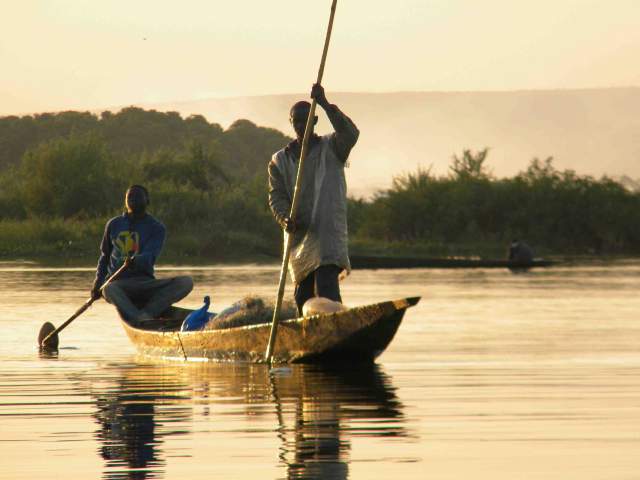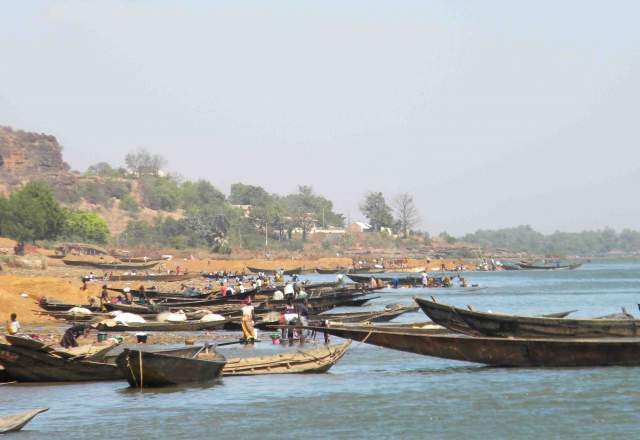22 Jun The secret of the Niger
Some of the great deeds of the 19th century, all of them protagonists of many of my confessable dreams, took place trying to unveil the mysteries of the Niger, a river that nobody knew where it was, nor where it was going, but which, perhaps for that reason, exerted an incredible power of attraction. A river with a rebellious spirit that, being born in the jungles of Futa Djalon, near the coast, prefers to flee from it, twisting and turning until it enters the burning sands of the desert against all logic... No, if I were a river I would do the same, I understand you perfectly well.

The prospect of returning to Mali this coming autumn, approaching the port of Koulikoro and sailing in a pinnace down the river to Timbuktu has made me think of those explorers who tried to get there following an irrepressible impulse. As strong as the one that motivated Gordon Laing to crawl for 600 kilometres through the desert of Tanezrouft despite being seriously wounded (he was shot twice and received up to 28 fairly serious sabre wounds), the one that gave Oudney the strength to die stoically on a camel consumed by fever, or dragged Mungo Park to go alone into the interior of Africa... Many others tried, Clapperton, Lander... all like Joseph Conrad, attracted by those blank spaces of marvellous mystery. I understand them too...

Of all those who tried, I think I identify most with Ledyard. It is said that he was summoned by the Royal Geographic Society to ask him to go to Cairo and from there to go into the interior of Africa, crossing a great unknown desert until he reached the Niger and revealed its secret. That day, when Sir Joseph Banks asked him when he would be ready to leave, he replied "tomorrow morning". That's the way I like it, impulsive and brainless, like one of the undersigned...

My path was different, as the wind had already erased the steps of those adventurers, and although much less dangerous, it was not easy either, as I was surprised by the Tuareg rebellion in Azawad, Captain Sanogo's coup d'état, the occasional terrorist attack, and worse, the lack of wifi coverage in most of the itinerary. So when I saw myself for the first time in front of the Niger, so close to Timbuktu, the lodestar of my Saharan travels, turning into reality what I had so often dreamed of as I ran over and over the map with a pencil, my eyes filled with tears and my heart with memories. But perhaps it was the gin and tonic I savoured watching the sunset over the Niger from that terrace in Segou that softened my feelings.

From the terrace I watched the last pinnace of the day go by. And this is how you have to travel along the Niger, slowly and in a pinaza, watching groups of women washing clothes, families of hippos or old men in the shade of a giant baobab tree, chatting, with all the time in the world to waste... The pinaza becomes the transport of the soul, a state of permanent adventure and continuous exaltation of the senses. The Niger is the axis of life, crossing islands of Bozo fishermen, Bambara villages or legendary cities such as Segou and Djenné. Unforgettable is the passage through the bustling port of Mopti at sunset or the mixture of aromas (or rather smells), colours, the music of a djembe or the cries of the markets where hundreds of Bambara, Dogon, Peuls, Bozos, Songais, Senufos, Mandingas or Tuaregs come with their Bellah slaves. Beyond the port of Mopti, the Niger enters the desert, and the solitude is felt in all its grandeur. Then comes Timbuktu, the Pearl of the Desert, the city of the 333 saints (although there are not so many left), or Gao, the capital of the Songhai empire.....

On its banks, a long time ago and thanks to the Spaniard Es Saheli, Sudanese art was born, who managed to unite water, mud and straw to form a sublime work of art and an unmistakable style. Go to the Djenné mosque, the largest mud building in the world, and see it with your own eyes, walk along its façade, while listening to the litany of children reciting the suras of the Koran... Go and see it and you will understand what I mean.
But another day I will tell you about these places, today I wanted to take you to Segou. Not far away are the ruins of Sekoro, the old Segou, the ancient capital of the Bambara empire, where time has long since taken its course and where it is now only the domain of the dead.

It was there, in Segou, on the banks of the river, after more than a year of travelling alone and after having been captured, beaten, robbed, cheated, made ill... that Mungo Park arrived and revealed the secret of the course of the Niger.
And happy with his feat, while explaining to a native, probably a Bambara, the importance of his achievement and the many sufferings he had gone through to achieve it, the surprised native, with that pragmatism so typical of the place, asked him: "Are there no rivers in your country?




Teo
Posted at 17:55h, 23 JuneBeautiful text full of history and with an ending that makes me reflect on the white man's curiosity to explore, to discover new horizons and remote places... why don't they feel that curiosity to explore other latitudes? Perhaps because they don't have the resources, but perhaps there is also a human component in their nature without the slightest interest in the unknown.
Timbuktu, mother of mine, its name alone evokes mystery, religion, wisdom and who knows how many other things buried by time and the desert sand. Magnificent entry.
Greetings...
undiaenlavidadecuchara
Posted at 18:52h, 23 JuneHi Teo, thank you very much for your message, I am very happy to know that you like my writings.
With respect to your reflection, it is clear to me that it is exclusively due to lack of resources. For us now it is very easy to travel and explore for as long as it takes, we know that it is only a parenthesis, when we get home everything will still be there, but there are so many thousands of Africans who leave everything and set off into the unknown in search of a better life, the objective is different but the uncertainty and danger in the face of the unknown is similar. I am going to recommend you to read two very different books: Kalilu's Journey, written by a Gambian boy who tries by all means to reach Spain, it is worth reading. The second book is An African in GreenlandIt is about an African from Benin who wants to discover what Greenland is like, less shocking than the first one but also curious. A hug
jose costa collell
Posted at 13:22h, 25 JuneMy first trip to Africa was to Mali, good memories, even when I got lost one night in the desert of Timbuktu hahaha and ended up in a camp that was not mine. A hug
undiaenlavidadecuchara
Posted at 16:21h, 25 JuneWell, Timbuktu was not the place to get lost and end up in another camp, which could be a bad one, hahaha. A hug